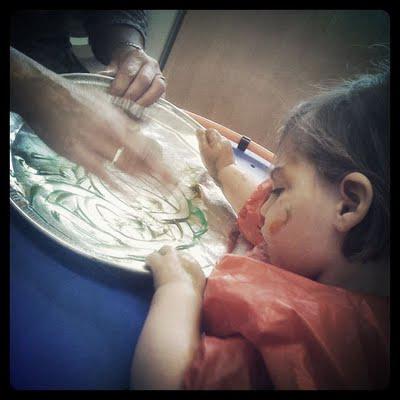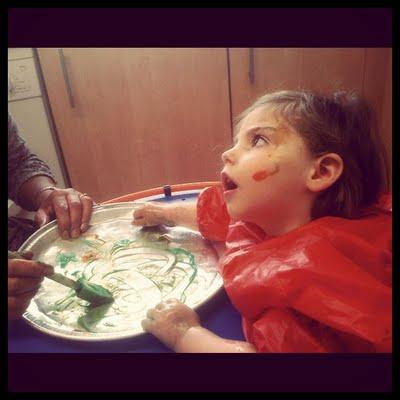Last Wednesday night, as part of a Healthy Deaf Minds event focussing on Deaf Carers in London, I gave a 15-minute talk on the subject, but I don‘t think I was particularly lucid. Writing preparatory notes didn‘t feel appropriate for such a personal subject - I chose instead to speak off the cuff - but as soon as I found myself facing a full house, the nerves aggravated the still-rawness of my experiences. I‘m glad to say that I pushed ahead regardless. If you‘d like to read the text summary of this talk, just click here.
Essentially, the message I was trying to convey was that my role as a parent-carer wasn‘t very clear-cut with Isobel in the early days. To begin with, I was just a worried mum; she’d just been born, and despite neonatal seizures and the brain injury she'd sustained at birth, there was no outward indication of her having a disability. Upon her return home after 17 days in hospital, the only thing that differed in her daily routine from non-disabled babies’ was her medication, but that felt like something she would grow out of.
 She began seeing a physiotherapist at two weeks old. When I asked why, I was told it was “just in case.” There were a lot of “just in case”s. At nearly every quarterly pediatric review she had, she‘d have her head circumference measured, and if the paediatrician did that twice we‘d know, rather worryingly, that it hadn‘t grown as much as it should.
She began seeing a physiotherapist at two weeks old. When I asked why, I was told it was “just in case.” There were a lot of “just in case”s. At nearly every quarterly pediatric review she had, she‘d have her head circumference measured, and if the paediatrician did that twice we‘d know, rather worryingly, that it hadn‘t grown as much as it should.But even when we started noticing the signs of CP in our daughter - I shall never forget her clenched arms shooting out like a Dalek’s from her bouncer as a four-month-old – we had no premonition of what was to come. No, not even in those dreadful, soul-eroding months when she was in and out of hospital for her fits every week (although today, she hasn’t had a seizure since August 2010).
Following her diagnosis at 11½ months old, the first inkling of my future role I got was when I was applying for Isobel’s DLA. One question asked, “Who is her main carer?” And I thought, “I suppose that would be me.” But that role has only became clearer with time, and only after diagnosis, when the Child Development Team became more assured in their work with Isobel - and began advising us on the exercises we should do with her at home.
Neither Miles or I asked to be parent-carers. It was imposed on us. Those who have worked with me personally will know me best as an art project manager, marketing officer and writer: hardly an ideal candidate for the business of caring. As I pointed out in my talk last Wednesday, there‘s no formal written job description with a list of responsibilities that you have to fulfil; you just have to find out for yourself as you go along.
 Before Isobel, I thought caring was basically looking after people as if they were babies: washing and dressing them, feeding them; changing their catheter bag, making sure they take their medication, sorting out their finances on their behalf, that sort of thing. In that context, it didn‘t seem all that different from parenting.
Before Isobel, I thought caring was basically looking after people as if they were babies: washing and dressing them, feeding them; changing their catheter bag, making sure they take their medication, sorting out their finances on their behalf, that sort of thing. In that context, it didn‘t seem all that different from parenting. Thus the past year has been a crash course in both caring and CP. We‘ve had to absorb huge chunks of new information at a time about a disability that we had no prior knowledge of, whilst striving hard to ensure that the work we do with Isobel as her carers – the rehab, the speech and language work, the physio, the medication, even the feeding – is not hampered by any anger, resentment, frustration or sense of injustice that we might feel as her parents.
Managing our emotions in this way can be daunting. This time last year, Isobel was diagnosed with cerebral palsy, and suspected to be hemiplegic (affected on one half of the body); following the results of her MRI scan last March, she was revealed to have quadriplegic CP (all four limbs), plus cognitive impairment caused by epileptic seizures in the past.
Who’s to say the outlook won’t change again next year? A bit like those radar images of clouds you see on weather TV forecasts, the patterns in Isobel’s brain are shifting right now. Effectively, it is the CP, or rather its evolution, that is defining our caring role, ensuring that each time a new, hitherto unknown aspect emerges, we adapt the exercises accordingly and in line with therapists’ expectations of us.
It can be emotionally, physically and mentally draining. There are times when I want to be Isobel’s mum, just lie her on the playmat and let her get on with it. But I can only do that for so long before my specialist caring responsibilities take over, compelling me to change her position once again. That kind of obligation never goes away. Imagine the many times when your whole body aches for a break, especially when your six-months-pregnant bump hangs as heavily as mine does on fours.
We do get a little respite. A volunteer comes in for two hours on Thursday mornings to work with Isobel. As a former nanny with experience of children with CP, it’s good to have her round. It’s not respite care per se, though: both Isobel and I are being assessed for direct payments to cover the costs of such services, which I hope to have firmly in place by the time my baby is due.
Not that we don’t need support from family; of course we do. But asking them is not that simple, as a Carers UK article discovered. They are not familiar with the responsibilities that bringing up a child with a disability like Isobel’s entails, and at times of high stress, we are ourselves sometimes unclear what form their support should take. That’s why external care support services are just as important.
Being a deaf parent-carer, I am beginning to realise, has its advantages. I don't get it when non-disabled parent-carers express horror and pity at the discovery that I am a deaf person bringing up a disabled child. How is that worse than being a parent-carer with no experience of disability?
Of course, deafness and CP differ wildly: for me to say that I am an expert in CP would be preposterous when Isobel is the one growing up with it, not me. But like most deaf and disabled people, Miles and I have experienced discrimination, prejudice and stigma in our lifetimes, and have developed strategies for overcoming these barriers. We both know that as she grows up, Isobel will too face these barriers, albeit in a different form. And as she builds survival strategies of her own, we will support her every step of the way.

